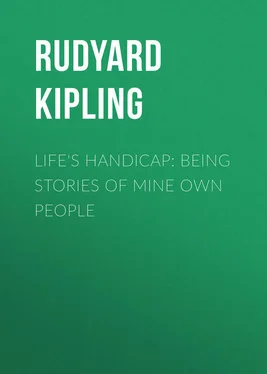Rudyard Kipling - Life's Handicap - Being Stories of Mine Own People
Здесь есть возможность читать онлайн «Rudyard Kipling - Life's Handicap - Being Stories of Mine Own People» — ознакомительный отрывок электронной книги совершенно бесплатно, а после прочтения отрывка купить полную версию. В некоторых случаях можно слушать аудио, скачать через торрент в формате fb2 и присутствует краткое содержание. Издательство: Иностранный паблик, Жанр: Классическая проза, foreign_antique, foreign_prose, foreign_sf, на английском языке. Описание произведения, (предисловие) а так же отзывы посетителей доступны на портале библиотеки ЛибКат.
- Название:Life's Handicap: Being Stories of Mine Own People
- Автор:
- Издательство:Иностранный паблик
- Жанр:
- Год:неизвестен
- ISBN:нет данных
- Рейтинг книги:5 / 5. Голосов: 1
-
Избранное:Добавить в избранное
- Отзывы:
-
Ваша оценка:
- 100
- 1
- 2
- 3
- 4
- 5
Life's Handicap: Being Stories of Mine Own People: краткое содержание, описание и аннотация
Предлагаем к чтению аннотацию, описание, краткое содержание или предисловие (зависит от того, что написал сам автор книги «Life's Handicap: Being Stories of Mine Own People»). Если вы не нашли необходимую информацию о книге — напишите в комментариях, мы постараемся отыскать её.
Life's Handicap: Being Stories of Mine Own People — читать онлайн ознакомительный отрывок
Ниже представлен текст книги, разбитый по страницам. Система сохранения места последней прочитанной страницы, позволяет с удобством читать онлайн бесплатно книгу «Life's Handicap: Being Stories of Mine Own People», без необходимости каждый раз заново искать на чём Вы остановились. Поставьте закладку, и сможете в любой момент перейти на страницу, на которой закончили чтение.
Интервал:
Закладка:
In India every trace of her was lost for six weeks, and no one knows what trouble of heart she must have undergone.
She reappeared, four hundred miles north of Calcutta, steadily heading northwards, very worn and haggard, but very fixed in her determination to find Georgie Porgie. She could not understand the language of the people; but India is infinitely charitable, and the women-folk along the Grand Trunk gave her food. Something made her believe that Georgie Porgie was to be found at the end of that pitiless road. She may have seen a sepoy who knew him in Burma, but of this no one can be certain. At last, she found a regiment on the line of march, and met there one of the many subalterns whom Georgie Porgie had invited to dinner in the far-off, old days of the dacoit-hunting. There was a certain amount of amusement among the tents when Georgina threw herself at the man’s feet and began to cry. There was no amusement when her story was told; but a collection was made, and that was more to the point. One of the subalterns knew of Georgie Porgie’s whereabouts, but not of his marriage. So he told Georgina and she went her way joyfully to the north, in a railway carriage where there was rest for tired feet and shade for a dusty little head. The marches from the train through the hills into Sutrain were trying, but Georgina had money, and families journeying in bullock-carts gave her help. It was an almost miraculous journey, and Georgina felt sure that the good spirits of Burma were looking after her. The hill-road to Sutrain is a chilly stretch, and Georgina caught a bad cold. Still there was Georgie Porgie at the end of all the trouble to take her up in his arms and pet her, as he used to do in the old days when the stockade was shut for the night and he had approved of the evening meal. Georgina went forward as fast as she could; and her good spirits did her one last favour.
An Englishman stopped her, in the twilight, just at the turn of the road into Sutrain, saying, ‘Good Heavens! What are you doing here?’
He was Gillis, the man who had been Georgie Porgie’s assistant in Upper Burma, and who occupied the next post to Georgie Porgie’s in the jungle. Georgie Porgie had applied to have him to work with at Sutrain because he liked him.
‘I have come,’ said Georgina simply. ‘It was such a long way, and I have been months in coming. Where is his house?’
Gillis gasped. He had seen enough of Georgina in the old times to know that explanations would be useless. You cannot explain things to the Oriental. You must show.
‘I’ll take you there,’ said Gillis, and he led Georgina off the road, up the cliff, by a little pathway, to the back of a house set on a platform cut into the hillside.
The lamps were just lit, but the curtains were not drawn. ‘Now look,’ said Gillis, stopping in front of the drawing-room window. Georgina looked and saw Georgie Porgie and the Bride.
She put her hand up to her hair, which had come out of its top-knot and was straggling about her face. She tried to set her ragged dress in order, but the dress was past pulling straight, and she coughed a queer little cough, for she really had taken a very bad cold. Gillis looked, too, but while Georgina only looked at the Bride once, turning her eyes always on Georgie Porgie, Gillis looked at the Bride all the time.
‘What are you going to do?’ said Gillis, who held Georgina by the wrist, in case of any unexpected rush into the lamplight. ‘Will you go in and tell that English woman that you lived with her husband?’
‘No,’ said Georgina faintly. ‘Let me go. I am going away. I swear that I am going away.’ She twisted herself free and ran off into the dark.
‘Poor little beast!’ said Gillis, dropping on to the main road. ‘I’d ha’ given her something to get back to Burma with. What a narrow shave though! And that angel would never have forgiven it.’
This seems to prove that the devotion of Gillis was not entirely due to his affection for Georgie Porgie.
The Bride and the Bridegroom came out into the verandah after dinner, in order that the smoke of Georgie Porgie’s cheroots might not hang in the new drawing-room curtains.
‘What is that noise down there?’ said the Bride. Both listened.
‘Oh,’ said Georgie Porgie, ‘I suppose some brute of a hillman has been beating his wife.’
‘Beating – his – wife! How ghastly!’ said the Bride. ‘Fancy YOUR beating ME!’ She slipped an arm round her husband’s waist, and, leaning her head against his shoulder, looked out across the cloud-filled valley in deep content and security.
But it was Georgina crying, all by herself, down the hillside, among the stones of the water-course where the washermen wash the clothes.
NABOTH
This was how it happened; and the truth is also an allegory of Empire.
I met him at the corner of my garden, an empty basket on his head, and an unclean cloth round his loins. That was all the property to which Naboth had the shadow of a claim when I first saw him. He opened our acquaintance by begging. He was very thin and showed nearly as many ribs as his basket; and he told me a long story about fever and a lawsuit, and an iron cauldron that had been seized by the court in execution of a decree. I put my hand into my pocket to help Naboth, as kings of the East have helped alien adventurers to the loss of their kingdoms. A rupee had hidden in my waistcoat lining. I never knew it was there, and gave the trove to Naboth as a direct gift from Heaven. He replied that I was the only legitimate Protector of the Poor he had ever known.
Next morning he reappeared, a little fatter in the round, and curled himself into knots in the front verandah. He said I was his father and his mother, and the direct descendant of all the gods in his Pantheon, besides controlling the destinies of the universe. He himself was but a sweetmeat-seller, and much less important than the dirt under my feet. I had heard this sort of thing before, so I asked him what he wanted. My rupee, quoth Naboth, had raised him to the ever-lasting heavens, and he wished to prefer a request. He wished to establish a sweetmeat-pitch near the house of his benefactor, to gaze on my revered countenance as I went to and fro illumining the world. I was graciously pleased to give permission, and he went away with his head between his knees.
Now at the far end of my garden, the ground slopes toward the public road, and the slope is crowned with a thick shrubbery. There is a short carriage-road from the house to the Mall, which passes close to the shrubbery. Next afternoon I saw that Naboth had seated himself at the bottom of the slope, down in the dust of the public road, and in the full glare of the sun, with a starved basket of greasy sweets in front of him. He had gone into trade once more on the strength of my munificent donation, and the ground was as Paradise by my honoured favour. Remember, there was only Naboth, his basket, the sunshine, and the gray dust when the sap of my Empire first began.
Next day he had moved himself up the slope nearer to my shrubbery, and waved a palm-leaf fan to keep the flies off the sweets. So I judged that he must have done a fair trade.
Four days later I noticed that he had backed himself and his basket under the shadow of the shrubbery, and had tied an Isabella-coloured rag between two branches in order to make more shade. There were plenty of sweets in his basket. I thought that trade must certainly be looking up.
Seven weeks later the Government took up a plot of ground for a Chief Court close to the end of my compound, and employed nearly four hundred coolies on the foundations. Naboth bought a blue and white striped blanket, a brass lamp-stand, and a small boy, to cope with the rush of trade, which was tremendous.
Читать дальшеИнтервал:
Закладка:
Похожие книги на «Life's Handicap: Being Stories of Mine Own People»
Представляем Вашему вниманию похожие книги на «Life's Handicap: Being Stories of Mine Own People» списком для выбора. Мы отобрали схожую по названию и смыслу литературу в надежде предоставить читателям больше вариантов отыскать новые, интересные, ещё непрочитанные произведения.
Обсуждение, отзывы о книге «Life's Handicap: Being Stories of Mine Own People» и просто собственные мнения читателей. Оставьте ваши комментарии, напишите, что Вы думаете о произведении, его смысле или главных героях. Укажите что конкретно понравилось, а что нет, и почему Вы так считаете.












